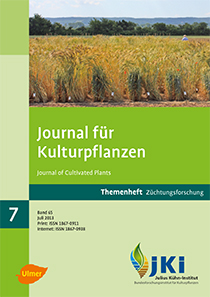Use of Crop Wild Relatives for Genetic Enhancement of Potato Germplasm with Improved Resistance to Late Blight (<em>Phytophthora infestans</em>)
DOI:
https://doi.org/10.5073/JfK.2013.07.04Keywords:
Potato, Phytophthora infestans, Solanum species, quantitative resistance, quality, plant genetic resourcesAbstract
Potato is among the most important food crops worldwide. Production of potatoes is threatened by late blight (Phytophthora infestans), a pathogen which constrains intensive chemical plant protection every season. Use of race-specific resistance genes from the primary genepool is no solution since the genetically adaptive pathogen quickly overcomes this type of resistance. A more sustainable approach appears to be using wild Solanum species from the secondary genepool as a genetic resource of quantitative resistance in potato breeding. Genetic enhancement of potato germplasm via introgressive pre-breeding is a time-consuming process which requires continuous commitment. Results obtained from the potato pre-breeding programme at the Julius Kühn-Institut (JKI) demonstrate that it is feasible to combine high degrees of quantitative late-blight resistance with earlier maturation and acceptable quality characters.
Downloads
Published
Issue
Section
License
The content of the journal is licensed under the Creative Commons Attribution 4.0 License. Any user is free to share and adapt (remix, transform, build upon) the content as long as the original publication is attributed (authors, title, year, journal, issue, pages).
The copyright of the published work remains with the authors. The authors grant the Journal of Cultivated Plants, the Julius Kühn-Institut and the OpenAgrar repository the non-exclusive right to distribute and exploit the work.







